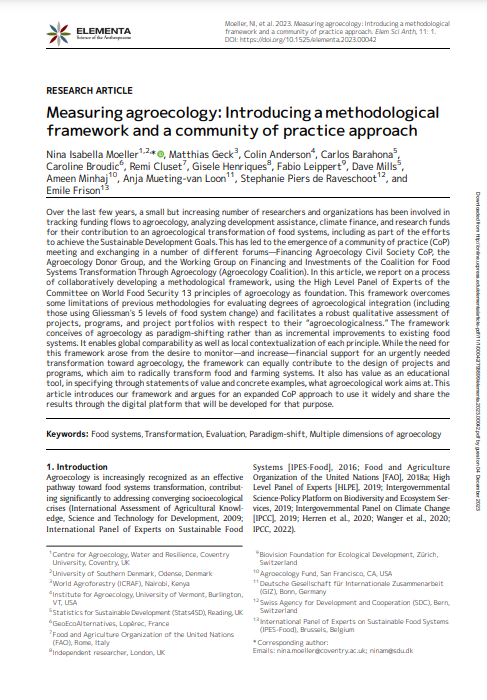Measuring agroecology: Introducing a methodological framework and a community of practice approach

Over the last few years, a small but increasing number of researchers and organizations has been involved in tracking funding flows to agroecology, analyzing development assistance, climate finance, and research funds for their contribution to an agroecological transformation of food systems, including as part of the efforts to achieve the Sustainable Development Goals. This has led to the emergence of a community of practice (CoP) meeting and exchanging in a number of different forums—Financing Agroecology Civil Society CoP, the Agroecology Donor Group, and the Working Group on Financing and Investments of the Coalition for Food Systems Transformation Through Agroecology (Agroecology Coalition). In this article, we report on a process of collaboratively developing a methodological framework, using the High Level Panel of Experts of the Committee on World Food Security 13 principles of agroecology as foundation. This framework overcomes some limitations of previous methodologies for evaluating degrees of agroecological integration (including those using Gliessman’s 5 levels of food system change) and facilitates a robust qualitative assessment of projects, programs, and project portfolios with respect to their “agroecologicalness.” The framework conceives of agroecology as paradigm-shifting rather than as incremental improvements to existing food systems. It enables global comparability as well as local contextualization of each principle. While the need for this framework arose from the desire to monitor—and increase—financial support for an urgently needed transformation toward agroecology, the framework can equally contribute to the design of projects and programs, which aim to radically transform food and farming systems. It also has value as an educational tool, in specifying through statements of value and concrete examples, what agroecological work aims at. This article introduces our framework and argues for an expanded CoP approach to use it widely and share the results through the digital platform that will be developed for that purpose.